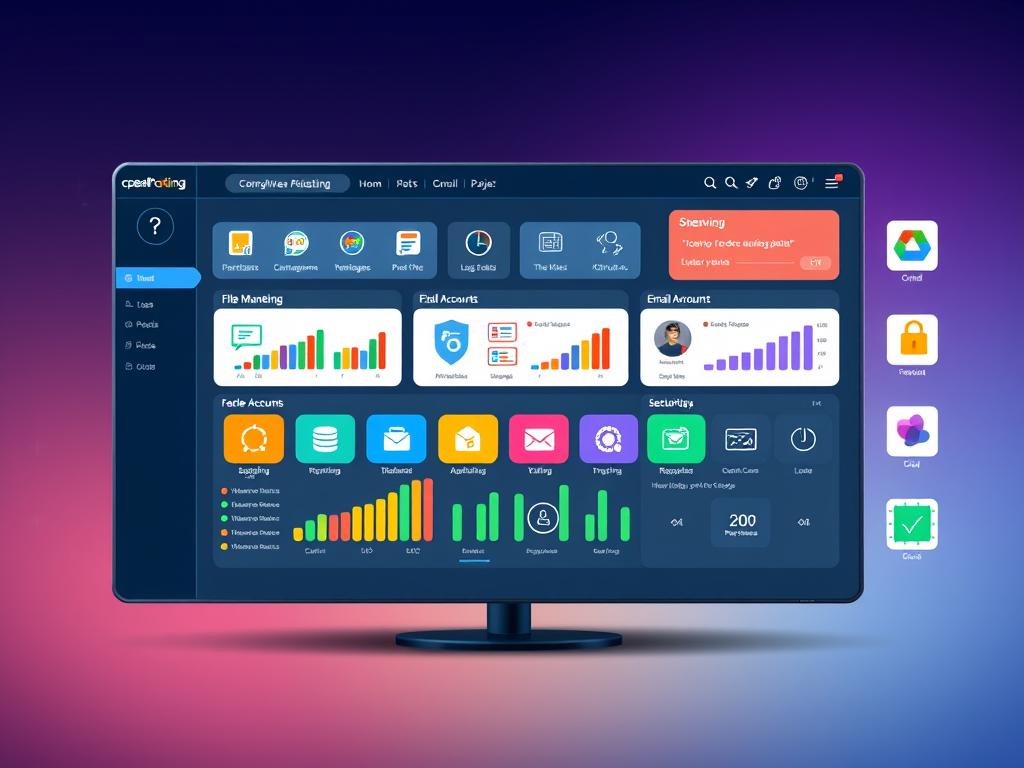cPanel is a web hosting control panel used by many for server management. It started in Houston and now handles over 70 million domains in 73 countries. This tool offers a simple way to manage server tasks like file management and email settings.
Even if you’re not tech-savvy, cPanel makes it easy to work with your web server. It’s a key tool for online entrepreneurs and digital professionals.
cPanel stands out for its easy-to-use design and strong features. It lets users manage their domains efficiently. We’ll explore more about cPanel’s benefits and how it can help improve your online presence.
Key Takeaways
- cPanel simplifies server management with an intuitive interface.
- It is effective for managing domains, files, and emails.
- Over 70 million domains trust cPanel for their hosting needs.
- Designed for both technical and non-technical users.
- Enhances website management efficiency and security.
Introduction to cPanel
cPanel is a key part of web hosting, making complex tasks easy. It’s a server interface that lets users work with their hosting servers smoothly. Whether you’re starting a blog or building a website, knowing about cPanel is crucial for managing your site well.
cPanel has tools for managing files, security, and more. It helps users work with FTP accounts, making teamwork easy. It also helps manage SQL databases, keeping your site running smoothly.
Installing apps like WordPress is simple with cPanel. It also makes managing SSL certificates easy, keeping your site safe. JetBackup makes backups simple, helping protect your data.
cPanel gives insights into your site’s traffic and usage. This helps users make smart choices for their site. About 70% of websites use cPanel, showing its importance. Also, most users have three email accounts per domain, highlighting the need for good communication tools.
Most cPanel users, about 80%, secure their sites with SSL certificates. Around 40% of users ask for help with these tasks. cPanel makes managing websites easier, helping new online entrepreneurs.
The Functionality of cPanel
Understanding cPanel is key for website managers. It’s a powerful tool with many features for web hosting. It makes tasks like file, database, and email management easier, so you can focus on your content.
File Management Tools
cPanel’s file management tools are easy to use. With the File Manager, you can upload, download, edit, and organize files. It’s like a digital toolbox that makes managing your website’s files simple.
Features like drag-and-drop and built-in text editors make it easy. This way, you can handle your files without hassle. cPanel makes sure everything is easy to find and use.
Database Management
Good database management is key for site data. cPanel has strong tools for SQL databases. You can create databases, manage user permissions, and make backups easily.
This helps your site run smoothly and grow. Knowing how to use these tools keeps your data safe and accessible.
Email Management Features
cPanel’s email tools help keep communication flowing. You can create email accounts, set up forwarding, and block spam. Tools like Apache SpamAssassin™ let you adjust spam filtering.
This makes it easy to stay in touch with clients and users. It boosts your productivity and makes managing emails simple.
What is a cPanel?
Knowing what cPanel is key for website management. It’s a control panel for easy web server management. It helps users and businesses manage their sites well.
cPanel lets you handle files, databases, email, and security settings in one spot. It has several main areas, like:
- Files
- Databases
- Domains
- Top Applications
- Metrics
- Security
- Software
- Advanced
- Preferences
- Applications
Today, cPanel manages over 70 million domains in more than 73 countries. This shows its big role in web server management.
With cPanel, you can check website stats, change security, or manage emails easily. It has control panel features that help you through each step. For more advanced tasks, the Web Host Manager (WHM) interface is available.
Creating cPanel Accounts
Creating cPanel accounts lets users manage their web hosting easily. We’ll look at the different types of hosting that use cPanel. This helps us set up our hosting to fit our needs.
Types of Hosting that Use cPanel
There are many hosting options with cPanel, each with its own benefits:
- Shared Hosting: Great for beginners, it lets many users share server resources and manage their sites.
- VPS Hosting: Offers more control and dedicated resources for those needing more power and flexibility.
- Dedicated Servers: Gives full control over the server, perfect for big businesses with lots of traffic.
The Role of Web Host Manager (WHM)
Knowing how WHM works is key for VPS or dedicated server admins. WHM is a powerful tool that boosts our hosting experience. It offers:
- Easy creation and management of multiple cPanel accounts, making it simple to handle different sites.
- Setting up account settings, like package assignments and custom features.
- Strong security options to keep each account separate from others.
WHM’s flexibility and control make it essential for anyone serious about hosting management!
Essential Features of cPanel
cPanel is known for making website management easy. It offers strong security and keeps data safe. This section looks at three key features that make it popular in web hosting.
Installatron for Application Management
cPanel shines with its Installatron feature. It lets users manage apps easily. With one click, you can install systems like WordPress.
Installatron makes setting up and keeping apps running smooth. It’s great for both newbies and experienced web developers.
Security Measures Offered by cPanel
Security is a big deal for cPanel. It has many tools to keep your site safe. These include SSL management, password-protected areas, and IP blocking.
These features protect your data and keep your site safe. You can focus on growing your site without worrying about security.
Backup and Restore Capabilities
cPanel also has great backup and restore tools. With JetBackup, you can set up regular backups. This keeps your site’s data safe.
If problems happen, restoring your site is easy. This gives webmasters peace of mind, knowing their work is backed up.
Benefits of Using cPanel
cPanel is a top choice for managing websites. It’s popular among online entrepreneurs and digital professionals. This is because it offers several key benefits for users with different levels of technical knowledge.
User-Friendly Interface for Non-Technical Users
The user-friendly interface of cPanel is a big reason for its popularity. It makes complex tasks easy, even for those without technical skills. Each tool and feature is labeled clearly, making it easy to navigate.
This makes it easier for new website owners to start. They can focus on building their online presence without getting stuck on complicated software.
Robust Support for Managing Multiple Domains
cPanel also excels in managing multiple domains. Users can manage many domains from one cPanel account. This saves time and makes managing websites easier.
This is great for webmasters and businesses with many websites. cPanel offers tools for domain and DNS management. It helps users grow their online presence without the usual headaches of managing multiple domains.
Comparing cPanel with Other Control Panels
Exploring web hosting means looking at a cPanel comparison with other control panels. cPanel and Plesk are top choices. cPanel is great for Linux servers with its easy-to-use interface and many features. Plesk, however, works with both Linux and Windows, making it perfect for users with both systems.
cPanel is known for its quickness and simple design. It makes managing your website easy, perfect for those who value simplicity. Plesk, on the other hand, has a modern look and supports more applications with its extensions. This is great for those who need more than basic website management.
| Feature | cPanel | Plesk |
|---|---|---|
| Platform Support | Linux Only | Linux and Windows |
| User Interface | Intuitive and Easy to Use | Modern and Clean Layout |
| Available Extensions | Extensive Plugin Library | Diverse Extension Support |
| Performance | Highly Optimized | Versatile with Multiple Integrations |
| Target Audience | Ideal for Linux Users | Suitable for Diverse Environments |
Knowing the differences is key to making the right choice. This Plesk vs cPanel analysis shows their unique benefits. It helps you pick a control panel that fits your web hosting needs. Taking the time to compare will help you make a better choice, improving your online management.
How to Access cPanel
Accessing cPanel is key to managing your website well. It starts with a simple step: logging in to cPanel. You can do this through your domain dashboard or by adding “/cpanel” to your domain name in the browser. This makes it easy to get into the cPanel interface.
Some hosting providers add extra security with two-factor authentication (2FA). This is important for keeping your account safe. When you log in, you might see options like cPanelID, Google Accounts, and Facebook. These options make it easier to get into cPanel.
The cPanel interface is usually found on port 2083. If you manage many domains or need more features, port 2087 takes you to the Web Host Manager (WHM). For email, use port 2096 to get into the Webmail interface.
If you’re into secure connections, you can use SSH. On Windows, use PuTTY, and on macOS or Linux, use native protocols. The standard SSH port is 22. In cPanel, you can manage your SSH keys, like deleting or viewing them.
To start, here’s a quick guide to access points and ports:
| Access Method | Port Number |
|---|---|
| cPanel Interface | 2083 |
| WHM Interface | 2087 |
| Webmail Interface | 2096 |
| SSH Connection | 22 |
Learning how to access cPanel is a great start for managing your website. Once you know the interface, you’ll find it easier to use tools and features. This will help you work more efficiently and keep your online presence in top shape.
Conclusion
In this cPanel summary, we’ve explored the many benefits of using cPanel for web hosting and website management. This powerful tool offers a wide range of features to make website management easier. It has a user-friendly interface that helps both beginners and experts manage their websites well.
For those looking to grow their online presence, using cPanel can be a game-changer. It helps ensure your website is secure with features like firewalls and malware scanners. It also makes it easy to scale your website as it grows.
Using cPanel is more than just managing a website; it’s about building a successful online business. With cPanel, you can navigate the path to online success more easily than ever!
FAQ
What is cPanel?
cPanel is a popular web hosting control panel. It lets users manage their web hosting accounts easily. It has a user-friendly interface for various server management tasks.
How does cPanel simplify server management?
cPanel makes server management easy. It offers tools for managing files, databases, emails, and security. This makes it simple for anyone to use, even if they’re not tech-savvy.
What are the key functionalities of cPanel?
cPanel has several key features. It includes tools for managing files, databases, and emails. These features help make managing websites easier.
Who can benefit from using cPanel?
Anyone who wants to keep their online presence up can use cPanel. This includes aspiring entrepreneurs, freelancers, and those with multiple websites.
What types of hosting environments support cPanel?
cPanel works well with shared hosting, VPS, and dedicated servers. It offers flexibility for different hosting needs.
What is the role of Web Host Manager (WHM)?
WHM helps administrators manage multiple cPanel accounts. It also oversees server configurations through pre-defined packages. This enhances management capabilities.
What security features does cPanel offer?
cPanel has several security features. It includes SSL management, password-protected directories, and IP blocking. These features help protect sites and keep data safe.
How does cPanel support multiple domains?
cPanel makes it easy to manage multiple domains. Users can handle various websites under one account. This simplifies website management for webmasters and businesses.
How does cPanel compare to other control panels?
cPanel is designed for Linux servers. It’s known for its speed, ease of use, and website management features. It’s a great choice for Linux users.
How can I access cPanel for the first time?
Accessing cPanel is easy. Users can log in through their domain dashboard or by adding “/cpanel” to their domain name in a browser. This makes logging in straightforward.






